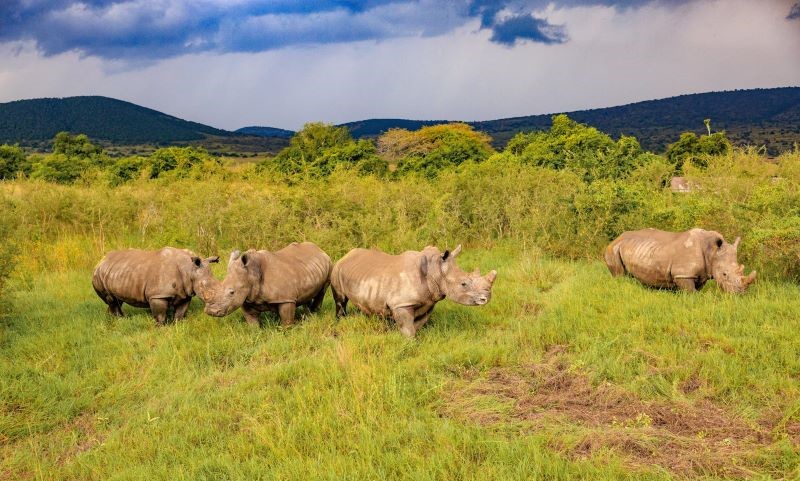Rwanda’s travel and tourism sector has achieved a milestone in 2024, breaking historic records in economic impact, visitor spending, and employment, and affirming the nation’s status as one of Africa’s fastest growing and sustainable travel destinations.
Data released by the World Travel & Tourism Council (WTTC) reveals that the industry not only rebounded from the pandemic’s toll but also soared beyond its 2019 performance, signaling a powerful comeback with long-term momentum.
The tourism industry’s contribution to Rwanda’s GDP reached Fr1.9 trillion in 2024, accounting for 9.8% of the national economy. This figure marks a 17.7% increase from the pre-pandemic peak in 2019.
The government’s deliberate efforts to prioritize tourism, through strategic policy support, infrastructure development, and environmental stewardship, have been instrumental in this success.
Employment figures mirror this economic upswing in which the tourism sector supported nearly 386,000 jobs in 2024, a record number that underscores tourism’s expanding footprint in Rwanda’s labor market.
International visitor spending reached Fr1 trillion, the highest ever recorded, which represents a rise of Fr169 billion compared to 2019.
Domestic tourism also flourished, generating Fr773 billion, an impressive 32.2% jump over pre-pandemic levels, and these figures indicate a broadening appeal of Rwandan travel experiences, both for local and foreign visitors.

Several key factors that have fueled this performance include a growing global preference for eco-tourism and authentic travel experiences has matched Rwanda’s strategic positioning as a destination that blends natural beauty with conservation.
Recently, seventy Southern White Rhinos were successfully relocated to Akagera National Park in a monumental move that positions Rwanda at the forefront of global conservation.
Flagship experiences such as gorilla trekking in Volcanoes National Park continue to attract international visitors seeking unique and sustainable adventures.
The construction of the new Bugesera International Airport also plays a central role in this growth trajectory.
Once completed, the facility will accommodate up to 14 million passengers annually, significantly improving Rwanda’s global connectivity and facilitating even greater international arrivals.
Forecasts for 2025 point to continued growth with the WTTC estimates the tourism sector estimated to contribute Fr2.1 trillion to Rwanda’s GDP next year, equaling 10.3% of the national economy.
The employment in the sector is also expected to surpass 402,000 jobs, or more than 8% of the country’s total employment.

International visitor spending is projected to hit Fr1.2 trillion, while domestic tourism is expected to bring in Fr822 billion, reinforcing the importance of both markets in Rwanda’s tourism strategy.
What sets Rwanda apart is its high-value, low-volume tourism model, which focuses on sustainability and community impact. The country’s commitment to responsible travel has earned it recognition as a global leader in eco-tourism.
In addition to Volcanoes National Park and the latest developments at Akagera National Park, Nyungwe National Park has further strengthened Rwanda’s image as a haven for nature lovers, conservationists, and adventure seekers alike.
But Rwanda’s tourism growth isn’t confined to the natural landscape. The country has become an increasingly popular destination for business events, conferences, and international sports competitions.
The Kigali Convention Centre and supporting infrastructure have positioned Rwanda as a hub for meetings, incentives, conferences, and exhibitions (MICE) tourism, broadening the sector’s appeal beyond leisure travel.
Rwandans themselves are also embracing the country’s tourism potential with efforts in place to encourage domestic travel through campaigns that highlight Rwanda’s cultural heritage, wildlife, and scenic beauty have led to a rise in internal tourism.
The sense of national pride in the country’s natural and historical wealth has become a strong driver of local tourism.
Looking ahead, Rwanda’s tourism industry shows no sign of slowing down because by 2035, the WTTC projects the sector will contribute Fr3.1 trillion to the GDP, making up 10% of the national economy, and support more than 545,000 jobs.
Over 140,000 new jobs are anticipated in the next decade, driven by innovation, infrastructure expansion, and the diversification of tourism products and experiences.
At the heart of Rwanda’s tourism journey is a commitment to sustainability which continues to balance growth with conservation and community benefit by not only building a successful tourism sector but also shaping a model for the future of global travel.

